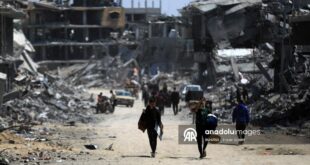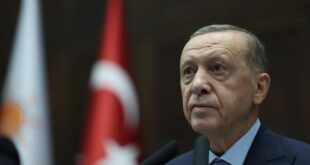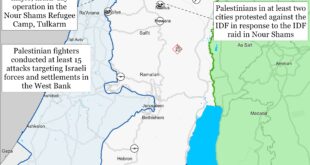No less than 13 intelligence and police personnel, including two intelligence directors, were killed.
A Turkish operation in northern Iraq ended in a bloodbath after special forces failed to rescue 13 elite intelligence and police officers who had been kidnapped by Kurdistan Workers’ Party (PKK) militants.
Turkish Defence Minister Hulusi Akar said that soldiers carrying out an operation against PKK militants in northern Iraq found the bodies of 13 Turks who had been kidnapped and executed in a cave.
Although Akar did not reveal the identity of the dead individuals, a high-ranking security source confirmed to Reuters that the identity of nine of the dead whose bodies were found in the cave had been ascertained. They include members of the Turkish intelligence, army and police.
Later, the governor of Malatya (eastern Turkey), where the bodies were taken, said that 10 of the victims, most of whom were police officers, had been kidnapped by the PKK in 2015 and 2016
Turkey had announced that Operation Eagle Claw – 2 was aimed at attacking PKK militants, but the intelligence and police officers’ deaths showed that it was intended as a rescue operation.
The Turkish foreign minister declared in 2017 that Ankara was working to bring home citizens kidnapped by the PKK. Turkish media had previously reported that Kurdish militants had captured two Turkish intelligence officers in Iraq.
Turkey’s confused reactions reflect the operation’s failure. Senior officials, including presidential spokesman Ibrahim Kalin, first asserted that civilians had died, before it was revealed that those killed were Turkish intelligence and police elite forces, and that Operation Eagle Claw – 2 was designed to save them.
Statements by Turkey’s Chief of General Staff Yasar Guler did not lessen the impact of the operation’s failure. Guler argued that Operation Eagle Claw – 2 was based on “very good evidence” on where the Turkish prisoners were being held.
According to Guler, Turkish forces reached the cave in question on the third day of the operation. Turkish reporter Fehim Isik expressed doubt about the defence minister’s account that prisoners were executed by the PKK.
Isik tweeted, “The prisoners were held for years by the PKK which did not kill them. Why did they kill them now?”
He added, “Hasn’t Turkey in the past managed to get back members of its forces following negotiations with the Workers’ Party? Why did it prefer that the prisoners die this time? Who benefits from their death?
Turkish-supported Islamist groups previously claimed that civilians had died, before news spread that the dead were Turkish intelligence and police officers.
Akar said that Turkey launched a military operation against the PKK in the Kara region in northern Iraq on February 10 to secure its borders and find two kidnapped nationals.
A statement published by a website linked to the PKK said that some of the prisoners it was holding, including members of Turkish intelligence, police and army, died when Turkey bombed the the area, and denied harming any prisoners.
The statement added, “Among the prisoners were two directors with the Turkish intelligence agency, and nine police officers and soldiers.”
In a previously posted video, one of the captured soldiers questioned whether the Turkish army was really working to save the prisoners, saying “I do not know if anyone is working for our liberation.”
The PKK, which is designated as a terrorist organisation by Turkey, the United States and the European Union, began an armed insurrection in the majority-Kurdish south-east region of Turkey in 1984. The conflict has claimed more than 40,000 lives.
Over the past two years, Turkey’s campaign against the party has increasingly focused on northern Iraq, where the group maintains a stronghold in the Qandil Mountains on the border with Iran.
Turkish operations have fueled tensions with the Iraqi government, as Turkish President Recep Tayyip Erdogan asserts that his country intends to solve the issue of the PKK in northern Iraq if Baghdad is “unable to.”
Iraqi intelligence sources previously revealed that the Turkish forces deployed to a number of locations in northern Iraq have expanded the scope of their reconnaissance missions in preparation for Operation Eagle Claw – 2.
The sources told The Arab Weekly that the Turkish air force carried out a large number of reconnaissance operations over northern Iraqi cities.
Erdogan had vowed that his country’s forces would “suddenly launch an operation one night in northern Iraq.”
Erdogan made his statement just days after Defence Minister Akar was dispatched to both Baghdad and Erbil to convey messages that were not completely friendly, according to well-informed political sources.
The sources said that the Turkish defence minister threatened Iraqi Kurdistan that Ankara would follow through with building a Turkish border crossing with Mosul that would deprive Iraqi Kurdistan of revenue if the region did not cooperate with it in the fight against the PKK.
Ankara’s failure to rescue the intelligence and army personnel showed that Turkish pledges on this issue, including Erdogan’s threat that “we will come one night,” have turned into a disaster for the Turkish army.
Erdogan’s phrase was repeated before Turkish military operations in the battles between Azerbaijan and Armenia. This time, the outcome was catastrophic for Ankara.
 Eurasia Press & News
Eurasia Press & News



